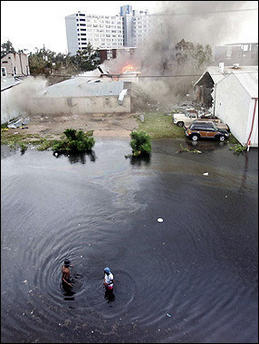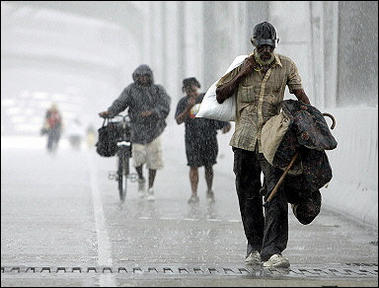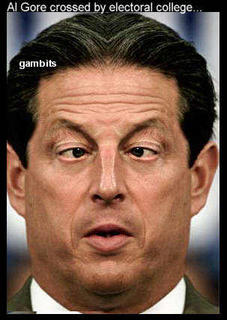
Fiscal watchdogs cite problems in handling disaster aid
By MARK BALLARD and MICHELLE MILLHOLLON
The handling of the first federal disaster relief money to arrive in the wake of Hurricane Katrina was riddled with improprieties, Louisiana's three top fiscal watchdogs say.
The process that granted $219 million in aid was fraught with irregular accounting, sloppy records and little oversight, they say.
State and local agencies will receive another $457 million this morning.
State Treasurer John Kennedy, Legislative Auditor Steve J. Theriot and state Inspector General Sharon Robinson stopped short of calling it fraud. But each says the way the money was awarded on Sept. 16 was so shoddy that the allegation may rise in the years that come.
All three blame the Federal Emergency Management Agency for failing to follow its own procedures and tossing out packets of money with little accounting.
"The FEMA people were over-zealous. They put these things on those forms, perhaps imprudently, so they could get the money out quickly," Theriot said.
"I don't want to suggest that it was monumental. But it would soon become so, considering the amount of money we're looking at down the road," he said.
Louisiana's congressional delegation is seeking $250 billion in federal money to help Louisiana get back on its feet after the storm hit on Aug. 29.
The seven packets of applications for the initial $219 million federal payment were processed without supporting documentation, proper signatures and identification numbers. Further, federal money was spent on work that was nowhere near completion.
In response, the three state fiscal officials instituted new procedures for supporting aid applications. And they "embedded" accountants with the disaster assistance teams to ensure the requests are properly documented.
Theriot said he already has met with U.S. Comptroller General David Walker to discuss how to address his concerns.
The Government Accountability Office, an investigative arm of Congress that oversees public funds, is initiating a review of FEMA's preparedness and response to the storm, said spokesman Paul Anderson.
FEMA officials don't disagree with the criticisms, saying that the agency initially tried to distribute the funds as fast as possible. That will change in the future as the needs become less urgent.
"We're not requiring the same level of documentation right now as we will down the road," said Brett Hansard, a FEMA disaster worker from Los Angeles who is working at the agency's Baton Rouge field office.
But FEMA does not supply the only members of the team that reviews requests for accuracy. Employees of the state Office of Homeland Security and Emergency Preparedness jointly fill out the forms with FEMA.
Major General Bennett C. Landreneau, who is the adjutant general for Louisiana and OEP director, did not return three calls Thursday.
Days after the storm, FEMA began processing the paperwork necessary to start the flow of money from the federal government to state and local agencies.
FEMA coordinators and OEP personnel helped state and local agencies fill out project worksheets that are supposed to detail damages, the cost and the scope of the work.
In the initial batch of seven worksheets, the only thing that varies from one project to the next is the cost. The description of damage dimensions is virtually the same -- almost word for word -- for each agency.
For instance, the State Police, like Lafourche, Orleans and St. Tammany parishes, sought money for "extensive response actions to alleviate immediate threats."
The State Police, however, had used much of its $340,030 to purchase boots for troopers and officers from other states helping with security.
The money was supposed to be reimbursements for actual expenses. That prevents an agency from later having to return money it didn't spend, Robinson said. Instead of documenting payments local governments already had made, FEMA approved cash based on estimates.
Robinson traces the problem to FEMA hiring people from outside the agency to do the paperwork. "They're contracting folks in to do a lot of this, and I don't know that a lot of them know what the rules are," she said.
At least three parish officials said FEMA only asked them for an estimate of how much money they needed.
"At first we gave them $5 million and they said, 'No, you have to be more realistic,' " said Kim Salter, assistant chief administrative officer for St. Tammany Parish. FEMA came in two days after the storm and asked for estimates.
Salter said she had the impression that the agency didn't have the time to deal with specifics. "Those days were nuts," she said.
St. Tammany received $323,609 in the first batch of aid.
The eye of Katrina passed over St. Tammany Parish, generating 6 million cubic yards of debris and flooding houses in Slidell to the roof-tops.
The parish spent $2.6 million to clear roadways. Picking up the rest of the debris could top $100 million, Salter said.
Lafourche Parish received $6.6 million from FEMA and is unsure whether it will spend all of it.
Parish Risk Manager Seth Holloway said the $6.6 million was officials' attempt at a good estimate. So far, the parish has only calculated about $300,000 in expenditures for materials, he said.
Most of the parish's expenses are for shelters, food for the National Guard and evacuees, gas and the use of school buses to take people from New Orleans to Thibodaux and Larose, he said.
Plaquemines Parish, where the hurricane made landfall, received $4.3 million from FEMA.
"That's just a rough estimate," said Jesse St. Amant, the parish's director of homeland security. "No one knows how much these things cost."
St. Amant said FEMA made it clear it wanted an estimate.
Once the applications are approved by FEMA, the federal money is deposited in the state's checking account, which is called the central depository account.
Treasurer Kennedy, who manages state funds, balked at signing the checks without better documentation.
Kennedy said Blanco administration officials told him to "just sign the checks."
Kennedy, Theriot and Robinson have instituted new accounting procedures, including acting as a watchdog over the worksheet process. State auditors are now "embedded" at FEMA's Baton Rouge headquarters to watch the worksheets as they're processed.
The objective, Robinson said, "is to make sure the agencies are using reasonableness in what they're asking for and make sure documents are prepared accurately."
"The situation in Louisiana is that the perception is almost as important as the reality," Kennedy said.
"This is an extraordinary chance for Louisiana to overcome its reputation. I think we ought to seize the opportunity and, besides, that money is meant for the people who have been hurt by this hurricane, not for the profiteers."










